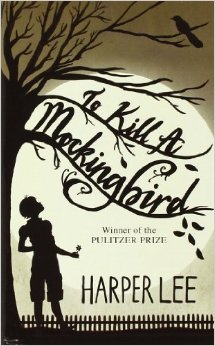
The unforgettable novel of a childhood in a sleepy Southern town and the crisis of conscience that rocked it,
To Kill A Mockingbird became both an instant bestseller and a critical success when it was first published in 1960.
It went on to win the Pulitzer Prize in 1961 and was later made into an Academy Award-winning film, also a classic.
Compassionate, dramatic, and deeply moving, To Kill A Mockingbird takes readers to the roots of human behavior
- to innocence and experience, kindness and cruelty, love and hatred, humor and pathos. Now with over 18 million
copies in print and translated into forty languages, this regional story by a young Alabama woman claims universal
appeal. Harper Lee always considered her book to be a simple love story. Today it is regarded as a masterpiece of
American literature.
Quotes and thoughts while reading:
Where the books, when considered where it comes from is awesome. It started off, me finding fun anecdotes to identify with,
then once the real meat of the book gets started it just goes in this whole other direction. So you'll see, the quotes I found to
be of interest change, I think dramatically, as the book goes on.
"I was bored, so I began a letter to Dill. Miss Caroline caught me writing... "Besides," she said. "We don't write in the first grade,
we print. You won't learn to write until you're in the third grade." (p 18) Gah, so incredibly frustrating!
On p 70 a house catches fire, in the dead of winter. I imagine it must be terrifying to fight a fire in the middle of winter. Water
spraying into the air, forming icicles on everything. I know I've seen images of New York firefighters just covered in ice.
"Atticus, are we going to win it? ... No, honey ... Then why-- ... Simply because we were licked a hundred years before we
started is no reason for us not to try to win.
There is a great scene whereabouts page 154, where via the writing we get little detail; because Scout does not fully
understand what is going on, we don't get to either. But what we get from it, is that childhood innocence and purity seems to
save the day and break the mob. "What's the matter? I asked... Atticus said nothing. I looked around and up at Mr. Cunningham, whose face
was equally impassive. Then he did a peculiar thing. He squatted down and took me by both shoulders... Doors slammed,
engines coughed, and they were gone." (p154)
"A mob's always made up of people, no matter what. Mr. Cunningham was part of a mob last night, but he was still a man. Every
mob in every little Southern town is always made up of people you know..." (p 157)
"That's what I thought, said Jem, but around here once you have a drop of Negro blood, that makes you all black." (p 162)
"you know the court appointed [Atticus] to defend this nigger... Yeah, but Atticus aims to defend him. That's what I don't like about it." (p 163)
"Mr. Finch, if you was a nigger like me, you'd be scared too... No suh, scared I'd hafta face up to what I didn't do." (p 195, 198) That terrible case where
you are damned if you do, and damned if you don't. If Tom had stuck around, he'd have been shot, no trial. But running away makes him look guilty. He
says it best, if you was a nigger like me, you'd be scared too.
"... there is one wat in this country in which all men are created equal -- there is one human institution that makes a pauper the equal of
a Rockefeller, the stupid man the euqal of an Einstein, and the ignorant man the equal of any college president. That institution, gentlemen,
is a court... Our courts have their faults, as does any human institution, but in this country our courtsare the great levelers, and in our courts
all men are created equal." (p 205)
"A jury never looks at a defendent it has convicted, and when this jury came in..." (p 211)
On page 213, when Atticus is almost brought to tears from the outpouring of food from the community I almost cried as well. "Tell them I'm very
grateful..." (p 213)
I wasn't very appreciative of the quip at women serving on juries, I doubt if we'd ever get a complete case tried-- the ladies'd be interrupting to ask
questions." (p 221) But given the time this was supposed to be written in (1935) it makes sense. Atticus is so forward thinking on equality, I suppose
I was surprised to see him backwards in this sense.
"Naw, Jem, I think there's just one kind of folks. Folks. ... That's what I thought, too, he said... [but] if there's just one kind of folks, why can't they
get along with each other? If they're all alike, why do they go out of their way to despise each other?" (p 227)
Chiffarobe: wooden chest / armoire / drawers
Entailment: Law settle the inheritance of (property) over a number of generations so that ownership remains within a particular group, usually one family
There is a reason this book is so well loved, and that is because it totally deserves it. It brings to the forefront any important topics, in a way that is
accessible, and interesting and entertaining. I'm upset I didn't love it when I was younger, but you can't be too hard on yourself I suppose. Definitely
grab a copy if you see and read it.
© JKloor 2015 Books
